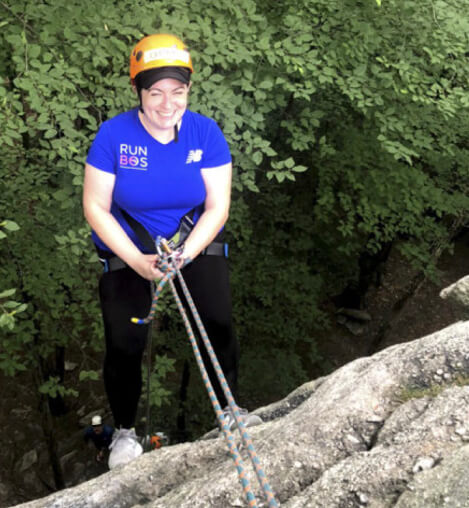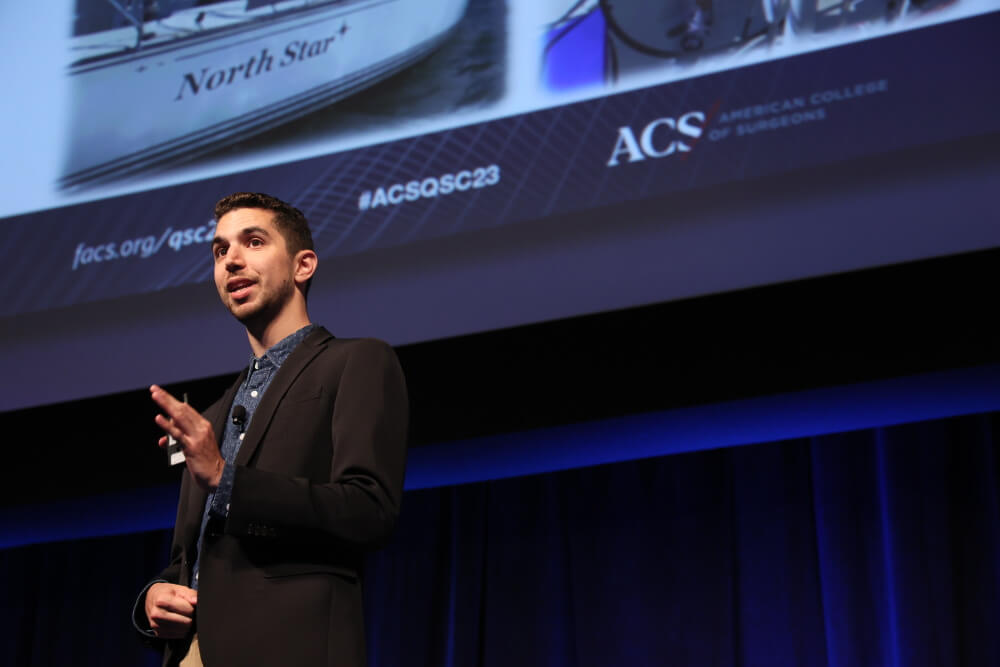Cancer has not stopped Bethany Ross and Jeremy Pivor from undertaking numerous adventures, from Pivor’s sailing trips on the high seas to Bethany’s forays into skydiving and outdoor rock climbing. It is also often the catalyst for their actions, such as when both Dana-Farber Brigham Cancer Center patients headed to Washington, D.C. to advocate on behalf of fellow cancer survivors.
Ross, 35, made her trip to Capitol Hill in late June after completing her latest round of treatment for the neuroendocrine cancer she has lived with since mid-2018. As a member of the steering committee for the Cancer Policy & Advocacy Team of the National Coalition for Cancer Survivorship, she met with members of Congress to appeal for the Comprehensive Cancer Survivorship Act (CCSA). Currently under consideration in both the House and Senate, the CCSA would address gaps in survivorship care and develop standards to improve the overall patient-centered quality of care and navigation needs of survivors and their loved ones.
“This bill addresses the health of cancer survivors throughout the entire continuum of care — from diagnosis to active treatment and post-treatment — to improve survivorship, treatment, and transition for all cancer survivors,” Ross tweeted from Washington. “I did this meeting the week after cancer treatment because this issue is too important to me to not go to DC and add my story of stage IV neuroendocrine cancer for the last 5 years!”

Multidisciplinary focus
The passion Ross has for advocacy is shared by Pivor, 32, who traveled to the nation’s capital in May seeking funding and legislation related to brain cancer, which he has been treated for as an adult at Dana-Farber Brigham and as a teenager at Dana-Farber Boston Children’s Cancer and Blood Disorders Center and its Jimmy Fund Clinic.
Presenting at the National Academies of Sciences, Engineering, and Medicine’s workshop on multidisciplinary and multispecialty cancer care, Pivor noted that while pediatric oncology patients are typically provided access to a variety of specialists, including occupational and physical therapists, social workers, and psychologists, during their visits, adult cancer patients not treated at centers with a focus on total patient care like Dana-Farber Brigham are often unaware such clinicians can even be part of their cancer care.
“I understood what multidisciplinary care meant because I experienced it in the Jimmy Fund Clinic as a child, but people who are being diagnosed in the adult care setting probably don’t have a real understanding,” Pivor said in a video shared with workshop attendees. “They need education so that they know what to expect.”
Pivor also noted the importance of understanding and addressing disparities as they relate to multidisciplinary care. While he has access to an excellent primary care physician and oncologist, and the financial resources and education needed to access them, others with cancer often do not.
“It is truly inspirational to see the work our young patients are doing,” says Cristina Pozo-Kaderman, PhD, a clinical psychologist at Dana-Farber and director of its Young Adult Program (YAP) in which both Pivor and Ross have participated. “Bethany and Jeremy have a found a way to use their cancer experiences to advocate and help others. The Young Adult Program will be offering an advocacy workshop this autumn on strategies to become more involved in this effort.”

Sharing their stories
Advocacy is nothing new to Pivor and Ross, who have both juggled full-time jobs and outreach work for years.
Pivor, who was first diagnosed at age 13, has served on numerous survivorship panels – including with the National Cancer Institute (NCI). His latest Washington trip was part of a two-month period in which he also presented at the American College of Surgeons (on how surgeons can improve their communication skills with patients) and at Duke University (during its Brain Tumor Conference).
Ross, who prefers to call herself a “cancer badass” rather than a survivor, believes that sharing stories of their cancer journeys is the best way that individuals can advocate for themselves and others. Like Pivor, she’s written extensively on her cancer experiences.
In a “Dear Cancer” letter she wrote for Elephants and Tea magazine, Ross said, “You made me want to make a difference by telling my story to anyone who would listen and to use my voice to advocate for people who were not ready to tell their own story yet. You may be stuck with me for life, but I am going to have you in my life how I want you.”

I am a 87 yr old cancer patient with metastatic prostate cancer, currently undergoing treatment with a new approved cancer drug. I have been managing my cancer for the past 30 years and am a big fan of ADVOCACY!–I am a member of the Longwood Cancer Support Group which has likewise been focussed on patient advocacy for the past 30 years–so I want to give them a shout out for their great work on behalf of PC patients. Please keep Longwood in mind when you are writing up stories about patient support and advocacy. And let me know how I can contribute also.
arthur mccaffrey